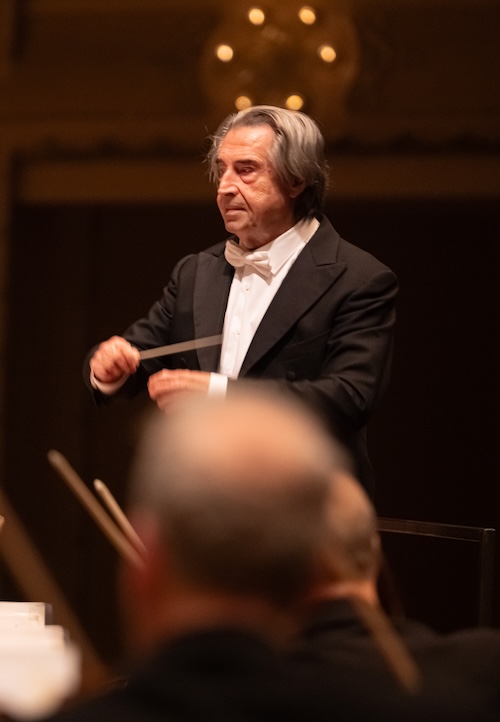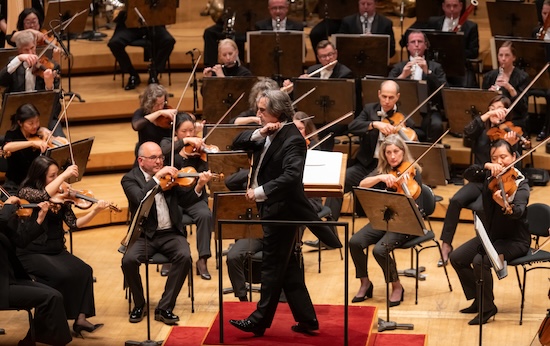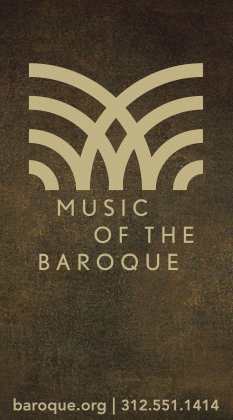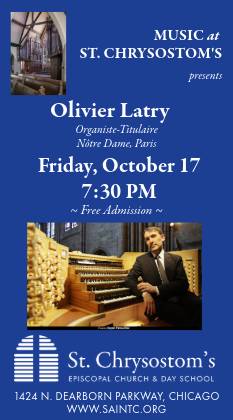Muti, CSO at their best in a silver-screen night of showpieces with Golijov premiere

Riccardo Muti clearly is enjoying his late-career residencies as music director emeritus for life of the Chicago Symphony Orchestra, and so are the musicians of an ensemble that remains in excellent fettle three years before Klaus Mäkelä assumes his mantle.
You could read all that in their facial expressions and body language alone at the CSO concert Friday night in Symphony Center, quite apart from the silken urgency of their playing.
Muti wrapped up his autumn residency with a program that included a little bit of everything, including a CSO commission that was getting its first hearing in Chicago: a suite by former composer-in-residence Osvaldo Golijov drawn from his score for director Francis Ford Coppola’s 2024 film Megalopolis.
Late this week it was announced that the maestro and CSO musicians will include the Megalopolis Suite on their eight-concert U.S. tour in January. (Oddly, the Golijov is absent from the Jan. 21 Carnegie Hall program.)
An appreciative audience that included both the composer and the film’s director (a distant cousin of Muti’s—who knew?) heard a sumptuously orchestrated suite that, quite by design, references film music of the 1950s and ‘60s, specifically the swords-and-sandals ancient-Roman epics scored by Miklos Rosza. The music, which runs roughly 20 minutes, leaps from cue to cue, often abruptly changing mood and character in the process. It is retro with a purpose, closely allied to Coppola’s all-encompassing cinematic memory-lane.
The opening section of the four-part suite in fact conjures the sweeping grandeur of Miklós Rózsa’s score for the film Ben Hur, its stentorian brass and percussion giving way to several lush love themes that whisk us from the banks of the Nile to 1940s Hollywood noir and back.
Not the least of the score’s aurally seductive appeal comes from the prominent tenor saxophone obbligato, played here by the virtuosic Timothy McAllister. Drifting jazzily over a haze of strings, his instrument shimmered and sighed, effectively an unseen character from the film. A concluding “Saturnalia” that is essentially the final music of the movie begins as an orgiastic riot of color before charging into an unabashed echo of the lovers’ apotheosis from Prokofiev’s Romeo and Juliet ballet. More martial-discordant pseudo-Rózsa and we are done.
A film score for the ages? Perhaps not. Golijov’s music is too derivative for that. But a premiere as splendid as Friday’s could convince you the Megalopolis Suite has legs enough to make it as a concert piece independent of the film.
Golijov joined Muti on stage to share in the hearty ovation, with Muti eventually turning the spotlight over to Coppola himself—”one of the greatest film directors of all time,” he said—while his cousin beamed from his box seat.

Italy and Spain figured in the musical travelogues that flanked the suite. With various first-chair players assuming solo duties in works by Donizetti, Chabrier and Falla, familiar music emerged as it so often does under Muti, newly minted.
He launched the Don Pasquale Overture of Donizetti at such a furious clip that audience members chuckled. Of course everything was there in stylish abundance: airy textures and buoyant rhythms wrapped in a frisson of theatrical charm.
We don’t get to hear Verdi’s I vespri siciliani often enough in the opera house, but the sprightly and irresistible Four Seasons ballet music that forms Scene 5 of the Third Act turns up often enough in concert as a stop-gap. Light on its pointe shoes, Muti’s reading was as colorful, vital and full of idiomatic character as you would expect to hear from so dedicated a Verdian, along with an orchestra he has made, on occasion, the finest Verdi pit band in the world.
This richly inventive music gives individual woodwinds ample opportunity to display their abilities, and here the first-chair players came through like the accomplished virtuosos they are, most notably Stephen Williamson, clarinet; Stefán Ragnar Höskuldsson, flute, and William Welter, oboe.
Chabrier’s Espana has for too long been relegated to the dutiful pops repertory, which is a shame, given how brilliantly constructed this nifty little showpiece is. Muti paid the music the compliment of taking it seriously, allowing the Iberian rhythms to snap and crackle with real bite and spontaneity.
Similarly, his take on Falla’s Three-Cornered Hat (Suite No. 2) reveled in eruptive color and heady Iberian atmosphere, the CSO dispatching everything to a fare-thee-well, especially a tough and taut “Miller’s Dance.” Muti is among the few non-Spanish conductors who really grasps the duende, or heightened sense of emotion, that lies at the core of this music, infusing his players with that deep understanding. Thanks to all of them, we got it too.
The program will be repeated 7:30 p.m. Saturday at Symphony Center. cso.org
Posted in Uncategorized








Posted Nov 09, 2024 at 6:53 pm by Peter Borich
Attended the Thursday night performance at the Krannert Center in Urbana. Wonderful, wonderful night of music making. Great to see the Maestro in a jovial mood. He even laughed about the late-arriving audience, which a few years ago at a Krannert appearance, he angrily chided.